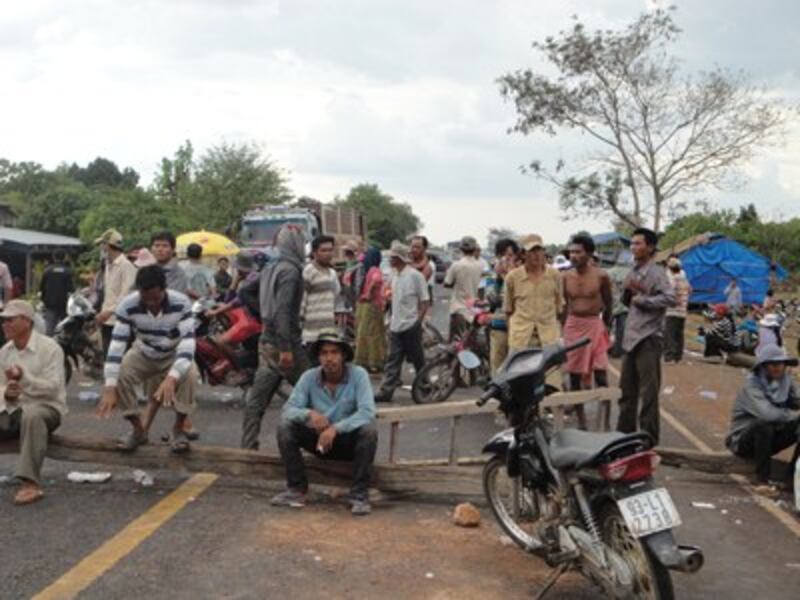As many as six villagers in eastern Cambodia were wounded Wednesday after being shot by a group of military personnel hired by a developer to carry out a forced eviction, according to witnesses and local officials.
The incident immediately drew condemnation from Cambodian rights groups who said the government should review its policy of allowing members of the military to serve as private security guards.
The guards fired army-issued AK-47 assault rifles into “a crowd of hundreds” at the site of the land dispute in Kratie province’s Snoul district, village representative Ouch Oun told RFA.
“Army officials hired to escort bulldozers sent by the TTY Company fired into the crowd of residents that had gathered to oppose the clearing of a cassava and cashew nut plantation. Four people were injured,” Ouch Oun said.
Cambodian non-governmental organization LICADHO reported that two women and four men were wounded in the mid-morning incident, while Cambodian rights group Adhoc said two of the six were severely injured.
One villager, Neth Ratana, told the Associated Press that around 10 security guards standing on trucks began shooting at protesters when they surrounded the excavating equipment and forced the drivers to stop clearing the land.
After the shooting, villagers took to the streets in protest, blocking National Road 76 which runs from Snoul district into neighboring Mondulkiri province, witnesses said. By late Wednesday night, villagers had vowed to block travel along the road until local authorities resolved their land dispute.
The villagers demanded that the local government halt the company’s work following the incident.
“We are appealing to the government to withdraw the company’s concession license based on popular opposition,” one villager told RFA by phone.
Villagers said they had settled in the area since 2006 when they began to plant cassava and cashew nuts, and TTY had only recently started to destroy their crops.
Another villager pled for assistance from the government.
“Please help us resolve the land dispute,” he said. “The company wants to destroy our crops and when we protested, they shot at us.”
Official response
Snoul district governor Iev Saphum visited the scene after the shooting and told RFA that local authorities have requested the villagers stop blocking the road. He added that authorities had agreed to compensate the victims.
“We will resolve the land dispute later,” Iev Saphum said.
“We are taking the victims to the hospital. I have promised the villagers that the authorities will pay their medical bills.”
He declined to comment about the shooting and whether the authorities planned to bring the suspects to justice.
The Associate Press reported that Kratie provincial governor Kham Phoeun had ordered police to investigate the guards.
Repeated attempts to contact company representative Ith Sarin, who is also an advisor to Cambodia’s military commander in chief, went unanswered.

Call for investigation
Samrith Vanna, the provincial coordinator for Adhoc, appealed to local authorities to apprehend the suspects.
“The security guards used illegal weapons. The government has failed to properly control the use of weapons. The company is hiring the security guards and using government weapons to protect their interests,” he said.
“The guards violently abused the rights of the villagers.”
Oum Samath, senior investigator for LICADHO, witnessed the shooting and condemned TTY’s decision to deploy armed guards in the dispute.
He also called on the government to review its policies in order to prevent private companies from hiring armed members of the military to provide security.
“We are saddened when villagers peacefully protest land disputes but are left seriously injured in shootings by company guards. This is a serious case that the government must resolve,” he said.
Cambodia’s land issue dates from the 1975-79 Khmer Rouge regime, which banned private property and forced large-scale evacuations and relocations throughout the country.
This was followed by mass confusion over land rights and the formation of squatter communities when the refugees returned in the 1990s after a decade of civil war.
Housing Cambodia’s large, young, and overwhelmingly poor population has posed a major problem ever since.
An estimated 30,000 people a year in Cambodia are driven from farmland or urban areas to make way for real estate developments or mining and agricultural projects.
Reported by RFA’s Khmer service. Translated by Samean Yun. Written in English by Joshua Lipes.
